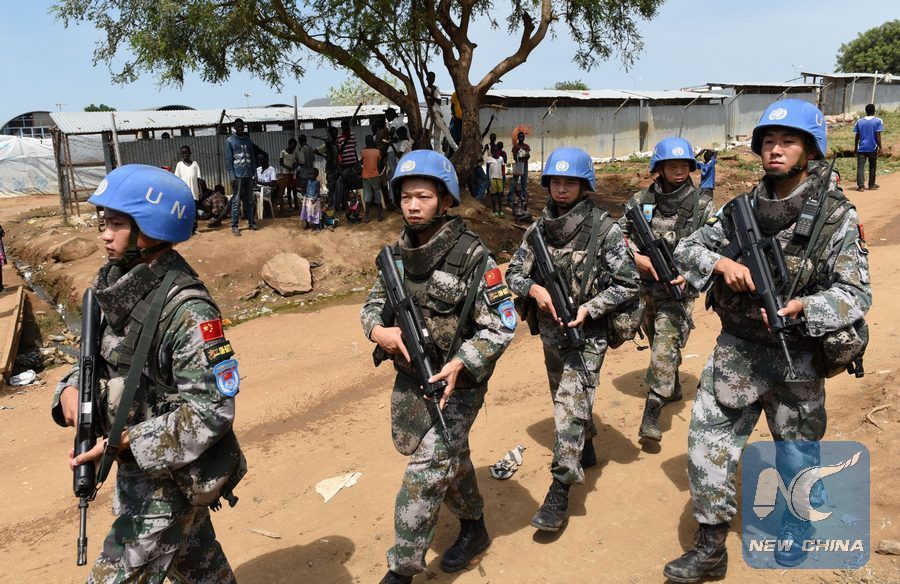
Chinese peacekeepers patrol at the Protection of Civilians site 1 beside the United Nations House in Juba, South Sudan, Aug. 11, 2016. (Xinhua/Li Baishun)
JUBA, Nov. 22 (Xinhua) -- Sanctions imposed on war-torn South Sudan will not solve, but instead escalate the ongoing conflict in the world's youngest nation, officials and experts have said.
This came after the United States last week circulated to the UN Security Council (UNSC) a draft resolution urging for arms embargo on South Sudan.
However experts have argued that the proposed sanctions will only harden the resolve of the warring parties to continuously pursue the unending military solution to the conflict.
"I don't believe sanctions will resolve the issue, they tend to harden the resolve of those in power. Sanctions have been tried elsewhere and failed to work," Juba-based Ebony Center for Strategic Studies researcher James Alic Garang told Xinhua on Monday in Juba.
He added that the solution is with the peace monitor -- the Joint Monitoring and Evaluation Commission (JMEC) and the international community in pressurizing both the government and rebel forces to implement the fragile peace agreement.
Garang also said that he did not believe South Sudanese leaders across the political divide have intention of driving the country toward the brink of genocide, despite reports of ongoing targeted killings.
The UN Special Adviser for genocide prevention Adama Dieng earlier this month warned that the oil-rich yet impoverished country risks descending into genocide based on intensity of targeted killings along ethnic lines.
"I don't believe South Sudanese have that appetite to go for full-blown genocide. But of course there are targeted killings along ethnic lines especially against the Dinka ethnic group from whom President Kiir hails," he observed.
The conflict since December 2013 between the SPLA-in Opposition (SPLA-IO) led by ousted First Vice President Riek Machar and troops loyal to President Salva Kiir has killed tens of thousands and displaced more than 2 million in the region.
South Sudan's foreign ministry spokesman Mawien Makol told Xinhua that the final solution to the conflict lay in implementation of the peace agreement signed in 2015 by the two warring parties.
"There is no reason for arms embargo here because the peace implementation is ongoing," he said.
Political science lecturer at Juba University Jacob Dut Chol told Xinhua that sanctions might work on individuals but make little sense to these leaders as they do not travel often.
"Overall sanctions won't help this country, what is needed is to engage the leaders on the peace agreement with special focus on the upcoming 2018 elections," Chol said.
He also noted that the 2018 elections present the opportunity to end the conflict as dissidents like Machar and the former agriculture minister Lam Akol are most likely to return to Juba to participate in the country's first-ever elections.
"We have never had election since President Kiir was elected in 2010 and he has been a transitional leader. Elections are going to end the entire headache in the country," Chol observed.
President Kiir was elected in 2010 before South Sudan won independence from Sudan in 2011.
Political analyst with the Sudd institute Abraham Awolich told Xinhua that proposed sanctions will demonstrate the failure of diplomacy in solving the conflict, and that if eventually imposed on the country they will strain relationship between the U.S,, UNSC and South Sudan.
"Once you impose sanctions you basically end diplomacy. When you punish somebody they will no longer cooperate with you," Awolich noted.
He further cautioned that if the UN Security Council wants to still have influence on both warring parties, they should desist from imposing sanctions.

